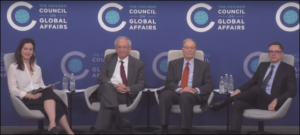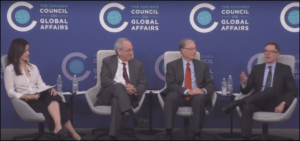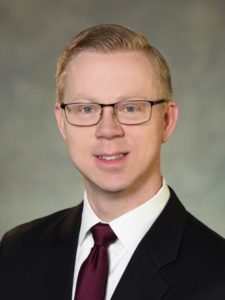What Does the Fed Do Now?
Three Former Fed Officials Discussed the Future of Monetary Policy
On Tuesday, January 24, I attended a presentation of The Chicago Council of Global Affairs entitled “The Future of Monetary Policy”. This was a discussion among Michael Moskow, former Chicago Fed President, Randall Kroszner, former Fed Governor, and Donald Kohn, former vice-chair of the Fed. It was moderated by author and journalist, Bethany McLean, who is known for her work covering the Enron scandal and the financial crisis.
“We are in Uncharted Waters”
Those were the words from former Chicago Fed President Michael Moskow, to describe the current challenges faced by the Federal Reserve. More than six years of ‘unconventional policy’ (buying assets to provide liquidity to the market) has ballooned the Fed’s balance sheet to over $4 trillion from a pre-crisis level of just $800 billion – a staggering increase. The task of moving back toward pre-crisis levels now falls to incoming chair, Jay Powell. He will be in charge of finding a way to pare back the balance sheet while also trying not to upset financial markets – something that has not been done before. This is especially delicate because any weakness in the economy could lead the Fed to reverse course.
The panelists all agreed that the consequences of unwinding current Fed policy are not completely known and should be considered a risk to the economy and financial markets. However, so far it doesn’t appear that market participants are all that concerned. Randall Kroszner even said, “It worries me that people aren’t worried”.
Trying to divest a $4 trillion balance sheet is a massive undertaking and the process could certainly rattle the markets. For instance, in 2013 then Fed Chair, Ben Bernanke, set the stage for “policy normalization” by introducing a plan to slow, or “taper”, the rate of asset purchases. The immediate negative market reaction was known as the “Taper-tantrum”. If this was how the market reacted to a slowing of the rate of purchases, imagine what could happen when the Fed begins outright selling.
“Complacency about low inflation”
It has been over four years since the Taper Tantrum and, as was promised, progress has been slow and steady. Perhaps after some initial anxiety, markets have now come to accept the continued gradual tightening of monetary policy. The former Fed officials on the panel, however, do not think we are out of the woods. While inflation has been muted throughout the recovery, there is still a risk that it could accelerate faster than anyone expects. Don Kohn outlined this as one of his key concerns by saying that there is “complacency about low inflation.” Markets could be caught off guard if inflation suddenly started accelerating.
While the panelists shared concern about the markets not fully respecting the risks involved with our current monetary policy environment, there was overall optimism about the current economy. They also all agreed that Mr. Powell had the potential to be a capable leader of the Fed. Bethany McLean did ask if the panel was ok with the fact that Mr. Powell did not have a Ph.D. in economics (considering the last 4 all did) and they all grudgingly agreed that it could work. There was genuine respect for Powell as a professional.
Looking forward, the panel expected the Fed to continue its course of trying to “normalize” monetary policy. This means that, barring any major economic shocks, we should expect to see the Fed Funds rate continue to rise gradually, bring an end to asset purchases, and eventually even begin asset sales, depending on how brave Powell and the Fed feel they can be.
Leaners vs. Cleaners
Even with the economy doing well, it was clear that the “unconventional” policies enacted during the financial crisis will have to at least remain in the tool-bag for the foreseeable future. If needed, the Fed will have to be able to resume buying assets and issue long-term guidance on rates to help steer monetary policy. The only question of debate was really how active the Fed will be under Powell.
Don Kohn described two camps on Fed policy – leaners and cleaners. He said that cleaners prefer to be less active and allow the government and fiscal policy to be the primary drivers of the economy. The Fed would come in and “clean up” when the economy goes off course. Leaners, on the other hand, will try to affect change by leaning monetary policy towards their desired outcomes.
While it isn’t certain into which camp Jay Powell will fall, the panel did agree that he will continue the transparency efforts of the Fed. So whichever route the Fed ultimately takes, they do expect it to be well communicated. It was even suggested that by not having a Ph.D. in economics he may be better able to communicate to the American public because he will be less worried about being technically precise and instead focus on being clearer about the spirit of the message.
The Bottom Line
The market consensus forecast is for interest rates to continue to rise gradually throughout the year. After hearing this presentation, I more firmly agree that this is the most likely scenario; however, the warnings about “uncharted waters” and “complacency” remind me that “most likely” does not equal “certainty”. Therefore it is incumbent upon us to prepare for possible alternative outcomes. What would happen if inflation does start to flare up this year? What would happen if the economy turns and interest rates go back down? We will continue to monitor the economic environment closely and make sure that while we are planning for what we think will happen; we also prepare for what could happen.
As always, if you have any questions, please reach out. I would love to hear from you.
Keith J. Akre, CFA, CFP® – Trust Officer
Opinions expressed are solely my own and do not express the views or opinions of Stillman Bank. Investments available through Stillman Trust & Asset Management (1) are not FDIC insured (2) are not deposits, obligations, or guaranteed by the bank and (3) are subject to investment risk including possible loss of principal.



